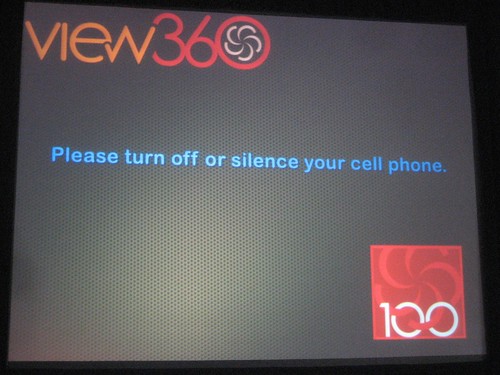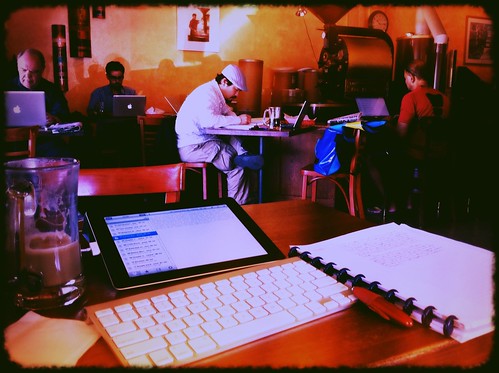"'Noise is the most impertinent of all forms of interruption,' groused the nineteenth-century German philosopher Arthur Schopenhauer. 'It is not only an interruption, but also a disruption of thought.'" So notes Chloe Schama in her New Republic piece explaining "How Silence Became a Luxury Product."
From noise-canceling headphones to the popularity of silent retreats, there has never been quite so great a premium placed on silence. And not only do we value it in a general sense, we’re willing to pay for it. Silence has become the ultimate luxury.
Of course, the battle for quiet– especially in cities– has been going on for a long time. What's behind the current rush to quiet? "The modern-day selling of silence," she argues, "seems to have less to do with either global health or the annoyance of a neighbor’s barking dog and more to do with a desire to push back against the gnat-like ticking of technology than anything else."
Technology has both increased our perceived need for silence and created (or at least improved) the means of attaining it. We’re assaulted by incessant technological “noise” and reliant on technology to control it. We’re battered by a ceaseless stream of emails and memos and tweets and status updates, but we plug into the latest iPod to tune it out. Those lightweight noise-cancelling headphones are the product of years of research and refinement. Same with the vacuum cleaner and the uber-quiet Lexus—or so their marketing materials would have you believe.
The piece is well worth reading. For me, it stimulates a couple thoughts– not criticisms of the article, but rather extensions of its argument.
First, while the latest model of Bose headphones may represent another example of capitalism's effort satisfy the desire of elites for "disconnection," Schama herself cites lots of historical studies that talk about the pursuit of public silence since Greek times. Personally, I might draw a clearer line between past and present, but that's just me.
Second, there's no question that one reason we select technologies to create silence is that the world has genuinely become noisier.
Third and most important, I would argue that while we may look to high-tech solutions to quiet the world or deliver the perfect noise-eliminating or soundproofing hack, what we're really looking for is something different from the complete absence of noise. A quiet environment, we think, will lead to a quiet mind. And that's what we really want.
We don't want the quiet of the world waiting to see what happens next as the tiger crouches or the sniper takes aim. We want psychological stillness, the absence of external interruption, and unbroken time for undisrupted thought.
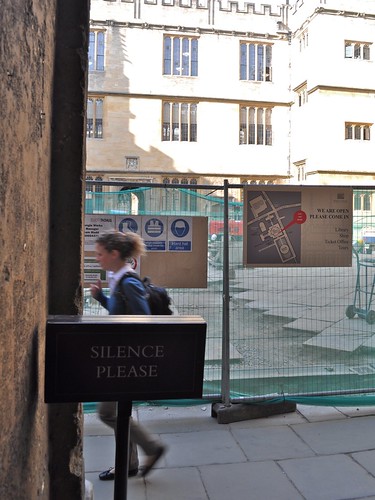
"silence, please:" bodleian library courtyard, oxford
This is is a state that can be supported by quiet; but there isn't a perfect inverse relationship between decibels on one hand, and concentration or creativity on the other. (The ambient noise in cafes can help some people concentrate, for example.)
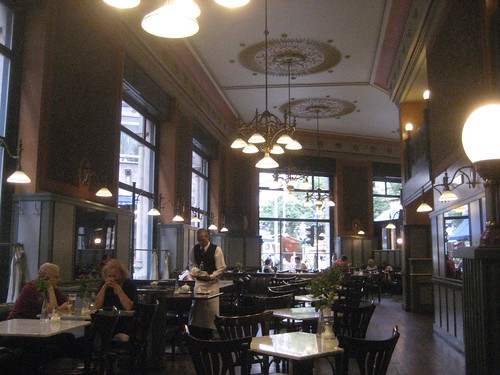
central kavehaz esetterem, budapest
In a sense, I'm arguing that "silence" is like calm. In ubicomp research there's a long history of talking about calm as the absence of stimuli, or as a physiological state. I argue that we should think of calm as an active thing, as an expression of skill, as a reward for mastery. (For more on this argument, read this, and this.)
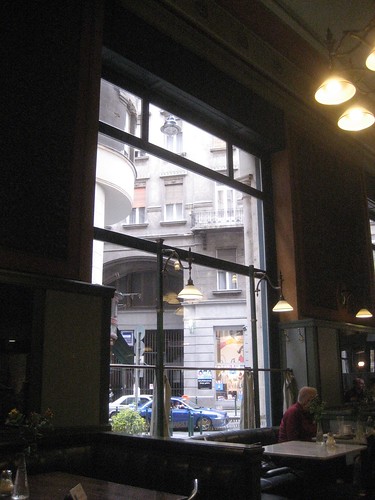
central kavehaz esetterem, budapest
Turning quiet from a spiritual and psychological thing into a technical one also leads us in an impossible direction. Ultimately, even if you eliminate all outside noise, you can still hear your own breathing, and your own heartbeat. You literally cannot have normal hearing and not hear. And believing that you can never get work done unless the world shuts up is a great way of never getting work done.
You can, however, be silent, and practice silence. Schopenhauer was right: noise is a disruptor of thought. But eliminating the worldly "noise" that disrupts us is only half the battle. You also have to deal with the internal noise as well.
